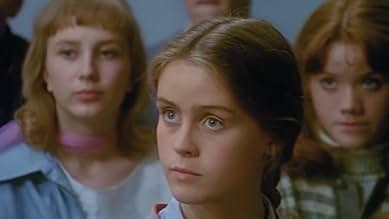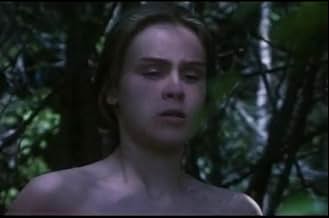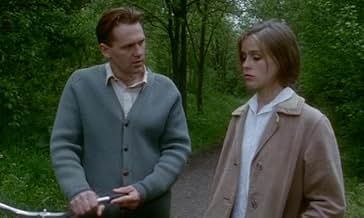VALUTAZIONE IMDb
6,9/10
1316
LA TUA VALUTAZIONE
Aggiungi una trama nella tua linguaThe Other Side of Sunday criticizes the small, and often tight church community. We follow the Preachers Daughter; Maria, in her journey to liberate herself from the stiff church community a... Leggi tuttoThe Other Side of Sunday criticizes the small, and often tight church community. We follow the Preachers Daughter; Maria, in her journey to liberate herself from the stiff church community and her strict religious father.The Other Side of Sunday criticizes the small, and often tight church community. We follow the Preachers Daughter; Maria, in her journey to liberate herself from the stiff church community and her strict religious father.
- Regia
- Sceneggiatura
- Star
- Candidato a 1 Oscar
- 9 vittorie e 7 candidature totali
Petter Width Kristiansen
- Pål Helge
- (as Petter With Kristiansen)
Recensioni in evidenza
Enough to put you off organised religion for life, this one.
A Norwegian girl on the cusp of adulthood in the 50's decides she no longer wants to be a Christian. This dismays the local community including her father, who just so happens to be the town priest. But what is boring sermons and staid hymns compared to boys, rock 'n' roll and long, refreshing dips in the nearby stream? No contest, really.
It's impossible to not be on Maria's (our rebellious protagonist) side as her dad never listens, her mother always takes his side and her siblings are under their thumb as much as she is. There's certainly a good way to have faith, but it's not to be found here: where apparently laughing at someone farting at the dinner table or wearing earrings is considered a major sin.
Marie Theisen is fantastic in the main role, alternating between euphoria at her newfound freedom and determination at her family's attempt to quell her uncovered adventurous spirit. She also says 'dog darn' a lot to avoid blasphemy, which makes no sense but is highly amusing.
Probably not one for regular churchgoers, who might find it a 'slur' on their beliefs. But everyone else though, it's an impressive piece of work that might just make you think twice before blindly believing in the hereafter... 7/10
A Norwegian girl on the cusp of adulthood in the 50's decides she no longer wants to be a Christian. This dismays the local community including her father, who just so happens to be the town priest. But what is boring sermons and staid hymns compared to boys, rock 'n' roll and long, refreshing dips in the nearby stream? No contest, really.
It's impossible to not be on Maria's (our rebellious protagonist) side as her dad never listens, her mother always takes his side and her siblings are under their thumb as much as she is. There's certainly a good way to have faith, but it's not to be found here: where apparently laughing at someone farting at the dinner table or wearing earrings is considered a major sin.
Marie Theisen is fantastic in the main role, alternating between euphoria at her newfound freedom and determination at her family's attempt to quell her uncovered adventurous spirit. She also says 'dog darn' a lot to avoid blasphemy, which makes no sense but is highly amusing.
Probably not one for regular churchgoers, who might find it a 'slur' on their beliefs. But everyone else though, it's an impressive piece of work that might just make you think twice before blindly believing in the hereafter... 7/10
Beautiful film for the art to describe the ineffable essence of an age, the subtle desire, the fear of social class, the image of religious vision like strong and necessary shell , the forms of beauty. It is exploration of a special metamorphosis in a delicate way, in kindly images, refined colors, with deep respect for atmosphere's details.
A young girl in an ambiguous war with a rigid world. A father for who the rules are untouchable, hypocritical gestures of a small universe, ethics like masks of general peace, slices of ordinary existence and vagueness of desires, dreams and feelings.
Mary is not a victim or rebel spirit. She is only explorer of her life. Her bold gestures or words, the innocent game, the refuge beyond the family's sphere are not elements of a real fight but steps for self definition.
It is a splendid film for the science to suggest the forms of existence's assume. For the sweet colors and for gentleness of artistic expression. For the discover of emotions like seeds of everyday. For the taste of Sunday.
A young girl in an ambiguous war with a rigid world. A father for who the rules are untouchable, hypocritical gestures of a small universe, ethics like masks of general peace, slices of ordinary existence and vagueness of desires, dreams and feelings.
Mary is not a victim or rebel spirit. She is only explorer of her life. Her bold gestures or words, the innocent game, the refuge beyond the family's sphere are not elements of a real fight but steps for self definition.
It is a splendid film for the science to suggest the forms of existence's assume. For the sweet colors and for gentleness of artistic expression. For the discover of emotions like seeds of everyday. For the taste of Sunday.
Hmm I see that this film has been enjoyed all over the world, and I must say I'm a little surprised.. I am a Norweigian and I have seen it a couple of times when it has gone on the TV for some years ago, but I never thought it would reach out to so many people... The funny thing is.... I'm in it. Now a 27 year old man going on 28, its strange seeing that even now, almost eleven years after, it still touches people. My part wasn't big, though I had a few lines, but it is such a strange feeling to have been part of something that still is held so close to the heart that some of the "fans" of the film keep it. I remember being a little embarrassed the first time I saw it on the premiere in Oslo, cause I guess i was hoping for something more exciting. You must remember I was only 16. But now I see it in a different way. I hope you all still will enjoy the film as I enjoyed being part of it..
Sondagsengler or The Other side of Sunday had all the elements to become a true classic. The cinematography is astounding. Unlike a lot of films today, the movie, Sondagsengler, had a great plot. I was hooked until I saw the ending credits.
It is the late 1950s in a small village in Norway. Bjørn Sundquist plays Johannes, a priest in the Church of Norway. Johannes has a wife, a son, and two daughters. The story revolves around Johannes, his pretty older teenage daughter Marie (Marie Theisen), and his church organist and assistant Mrs. Tunheim. Oddly we never know the family name of Johannes' family--the only person with a last name is Mrs. Tunheim, and we never know her first name. Johannes is stern and unyielding in his behavior. In the pulpit he is seen promoting the usual Christian pieties; his congregation looks like they are attending a funeral rather than a service. The rule is to look straight forward during a service and the first hint we get of what is to come is Marie's pinching her sister during a service. Johannes is harsh with his family and a prominent theme is the ongoing battle of wills between him and Marie. However, in several scenes we see a human side of Johannes that somewhat soften the initial stereotypical image that we might have of him.
Marie struggles to understand her religion and her burgeoning sexuality. Even in the face of the rigidity of her father's religious positions (or because of them) Marie has questions. As one example of her questioning consider this conversation with Mrs. Tunheim:
Marie: Do you think God did a poor job when he created man?
Mrs.Tunheim: Why do you ask?
Marie: He created us so that we have to ask forgiveness all the time. Isn't that a poor creation?
Or this reflection: "Isn't it just some sort of invention to love and cherish until death do you part? I love meatballs, but I cannot promise God that I will do that for the rest of my life." The movie often mixes humor with its more serious considerations.
Music plays an essential role in the film, ranging from Bach to 50s pop ballads. Music contributes to some exquisitely beautiful scenes like the one where Marie swims naked in the river.
All the actors capably handle the subtle complexities demanded of them, but it is ultimately Marie Theisen who carries the film and raises it above the average. She perfectly captures the questioning innocence at the core of Marie's personality and the stubborn persistence to find her own way in an environment that is trying to impose conformity. Marie is not about to give up on God, she is just looking for her own God--a God of nature, a God of forgiveness, a God who likes us when we are happy. This movie can be seen as a kinder and gentler version of a Bergman film that treats the same themes.
Expect surprises on the way to a definitive final scene.
Marie struggles to understand her religion and her burgeoning sexuality. Even in the face of the rigidity of her father's religious positions (or because of them) Marie has questions. As one example of her questioning consider this conversation with Mrs. Tunheim:
Marie: Do you think God did a poor job when he created man?
Mrs.Tunheim: Why do you ask?
Marie: He created us so that we have to ask forgiveness all the time. Isn't that a poor creation?
Or this reflection: "Isn't it just some sort of invention to love and cherish until death do you part? I love meatballs, but I cannot promise God that I will do that for the rest of my life." The movie often mixes humor with its more serious considerations.
Music plays an essential role in the film, ranging from Bach to 50s pop ballads. Music contributes to some exquisitely beautiful scenes like the one where Marie swims naked in the river.
All the actors capably handle the subtle complexities demanded of them, but it is ultimately Marie Theisen who carries the film and raises it above the average. She perfectly captures the questioning innocence at the core of Marie's personality and the stubborn persistence to find her own way in an environment that is trying to impose conformity. Marie is not about to give up on God, she is just looking for her own God--a God of nature, a God of forgiveness, a God who likes us when we are happy. This movie can be seen as a kinder and gentler version of a Bergman film that treats the same themes.
Expect surprises on the way to a definitive final scene.
Lo sapevi?
- QuizIn 1997, this movie was nominated for an Oscar in the category "best foreign language film". Marie Theisen, who was 15 years old during the filming, had the main role in it. In an interview, she said that she realized her full nude swimming scene was difficult to accept for the American audience, but she thought it was well done and absolutely necessary for the context.
- ConnessioniReferenced in Norsk film er ____!?: I FOKUS på Norske Oscar-nominasjoner (2022)
- Colonne sonoreLove letters in the sand
Performed by Pat Boone
I più visti
Accedi per valutare e creare un elenco di titoli salvati per ottenere consigli personalizzati
- How long is The Other Side of Sunday?Powered by Alexa
Dettagli
Botteghino
- Lordo Stati Uniti e Canada
- 4769 USD
- Fine settimana di apertura Stati Uniti e Canada
- 2621 USD
- 3 mag 1998
- Lordo in tutto il mondo
- 4769 USD
Contribuisci a questa pagina
Suggerisci una modifica o aggiungi i contenuti mancanti

Divario superiore
By what name was Søndagsengler (1996) officially released in Canada in English?
Rispondi






















